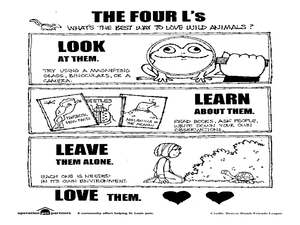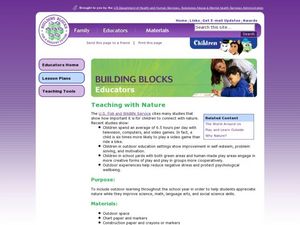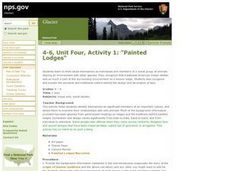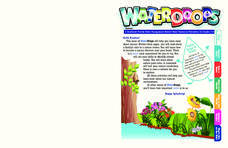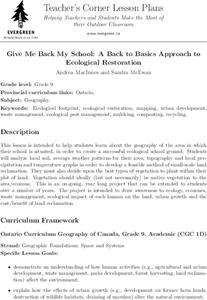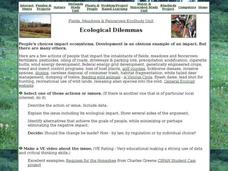Curated OER
Environmentally Friendly
What can your pupils do to promote better conditions for wildlife? After researching issues around wildlife management, class members use the Internet to locate three different organizations devoted to protecting wildlife. They then...
Curated OER
Let's Roam Together
Students collect information about buffalo and transform their classroom into a wildlife park. In this conservation lesson, students work in groups to research a question pertaining to buffalo populations and habitat requirements. They...
Curated OER
Invasion of the Habitat Snatchers!
Fourth graders investigate invasive plants found in a park or school environment and acknowledge the problems caused by the plants. They describe 4 methods of control of invasive plants.
Curated OER
Stop, Look and Listen
Students study and observe city wildlife and their local community's wildlife. In this wildlife lesson, students look for animal clues in their local places. Students observe animals using cameras and journals. Students make a...
Curated OER
Public lands: Preserve or develop?
Learners compare and contrast the characteristics of various public lands in Canada, including national forests, wilderness areas, national and provincial parks, wildlife sanctuaries, recreation areas and national historic sites. They...
Curated OER
An Elephant Never Forgets
Students are introduced to the Addo Elephant National Park in South Africa. In this natural science lesson plan, students identify the elephants by name according to the diagrams. Students study the unique characteristics of the...
Curated OER
Wonderfully Wild Unit the four L's of Wildlife
Students appreciate the natural environment. In this "four L's" lesson, students observe, reflect and appreciate unique ecosystems and how they help sustain life. Students create posters with the four L's.
Curated OER
Wildfire: Friend or foe?
Students explore positive and negative effects of wildfire and analyze positions on fire management. They conduct library research to uncover as much about wildfires and prescribed burns as they can. Students participate in a role-play...
Curated OER
Born to be Wild
Students watch an episode depicting the human vs. polar bear conflict in Churchill, Canada. They conduct online research and analyze the information. They interpret the facts and use storytelling techniques and role playing to convey...
Curated OER
Protective Agencies
This rare resource is a brief overview of some of our government protective agencies. There is a slide for each of the following: Bureau of Land Management, Department of Fish and Wildlife, National Parks Service, Environmental...
Curated OER
The Queen's Empire
Eighth graders study insects and make observations about their habitat. in this insect research lesson students research the Internet to compile information on ants.
Curated OER
Teaching with Nature
Students participate in a nature walk to learn about their natural environments. In this nature study lesson, students brainstorm a list of things to look for on their nature walk. Students go on the nature walk and locate objects they...
Curated OER
"Go Batty"
Students make a bat from a paper tube. They suspend bats from the ceiling or create a "cave" from black construction paper on a bulletin board or wall. Have students help you! Tape or staple student made bats in the "cave" to stress to...
Curated OER
Wild Dog Debate
Pupils participate in a mock conference addressing the possible extinction of African wild dogs. In this wild dogs lesson plan, students state their arguments and ask questions about the issues they have researched.
Curated OER
Painted Lodges
Students explore lodge construction as a representation of culture. In this cultural diversity and Native American history lesson, students listen to a narrative explaining the origin of Native American painted lodges. Students design...
University of Wisconsin
Conjunction Function
As part of a unit, this lesson familiarizes youngsters with components of a rain garden. They speculate about the role of an assigned component in contributing to a rain garden, and ultimately, in the health of the local watershed. Each...
PBS
Season Seeking
It's a time of change. A hands-on activity engages young scientists in a lesson highlighting the change of seasons. They brainstorm indicators of season changes in nature and then look for them. Next, they record observations in a field...
Curated OER
This Land Is Our Land
Students research federal land holdings. They explore how those lands are used. They map these lands and design their own legends. They discuss whether or not the land is being used accordingly.
Curated OER
Waterdrops
In this environment worksheet, students read an article about water drops and the nature center. They pretend that they are going to a nature center and write what they would hope see there. Students also identify living things and...
Curated OER
Identify the Three Economic Sectors
Students identify the three economic sectors found in the United States. They organize different foundations into these three categories. They examine why each sector is necessary in our society.
Curated OER
How Does Preserving Wilderness Enhance Forestry
Students identify events of the environmental movement in the United States. For this environment lesson students study Theodore Roosevelt and John Muir, who had a great impact on the environmental movement.
Curated OER
Give Me Back My School: A Back to Basics Approach to Ecological Restoration
Ninth graders research local geography to create successful, ecological school landscaping. They determine soil type, average weather patterns and temperature graphs and use the information to select ideal plants and plant maintenance...
Curated OER
Mystery, Myth, and Wonder: The White Elephant
Students examine the role of the elephant in the culture of Thailand through many different class activities based on a PBS program "The White Elephants of Thailand with Meg Ryan". Students also look at the impact of technology on...
Curated OER
Ecological Dilemmas
In this ecological dilemmas worksheet, students read about people's impact on ecosystems. Students complete 3 activities that require them consider the negative impact humans have on their environment.








